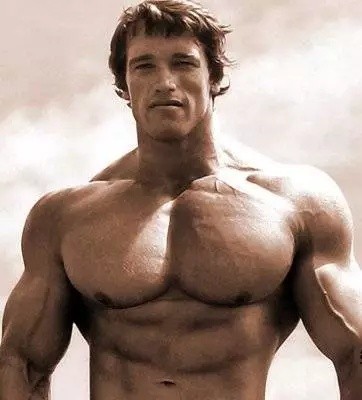
Why You’re Not Gaining Muscle
If you’ve been training hard for some time but you haven’t made the sort of gains you were hoping for, or if you have hit a plateau and your gains have come to a halt, there’s probably a simple reason for that. And once you find out what that reason is and do something about it you’ll be able to start growing again.
So, to help you discover what it is that’s holding you back, here are the 12 most common reasons why you may not be gaining muscle:
1. You’re Not Eating Enough
This is the most common mistake people make when trying to gain muscle. If you want to get bigger you need to eat more. A calorie intake of 16 – 18 times your bodyweight in pounds will be enough for most people, but if you are a really skinny hardgainer you may have to go as high as 25 times your bodyweight.
Don’t overdo it though as your body can only gain so much muscle in any given time period. And any extra you eat on top of what’s required for that will just be turned to fat. So keep an eye on your body fat levels and adjust your calorie intake accordingly until you find the right amount for you.
Apart from calories you also need to ensure you’re getting enough protein. At least 1g per pound of bodyweight should be consumed on a daily basis. Get this mostly from quality protein foods such as meat, fish, eggs, milk, cheese and whey protein.
Carbohydrates are important too as they will help to fuel your workouts, as well as plumping out your muscles. So you won’t gain well on a low carb diet. Add to this some good healthy fats and plenty of fruit and vegetables to ensure you get all the vitamins, minerals and phytonutrients you need, and you’ll have a good well roundedmuscle building diet that will enable you to get the results you want.
2. You’re Training Too Heavy (or Too Light)
To gain muscle size you need to challenge your muscles with heavy weights. But if you go too heavy you may get stronger but you won’t gain much size. Conversely weights that are too light might give you a great pump and burn, but again they will not help you gain much in the way of increased muscle size. So for best results use a weight that allows you to get between 6 and 12 reps for most of your sets.
The 5×5 workout routine is great for beginners, and will build both size and strength very effectively. But after you’ve been training a while you’ll need higher reps if you want to elicit further growth.
You should also vary your reps to get the best results. So you might do 8 – 10 reps for a while, then 10 – 12 reps for a few weeks, and then 6 – 8 reps for a while longer. You could do 4 – 6 weeks on each, or vary them week by week. Either way will work, but some variation is necessary for optimal results.
3. You’re Doing Too Much Volume (Or Too Little)
You do need a certain amount of volume in order to gain muscle effectively, and the “one set to failure” method will not give you the results you are looking for. Mike Mentzer did not build his physique by doing just one set of an exercise, and taking it to failure, and neither did anyone else.
However, if you are doing 4 or 5 exercises per body part, and 4 – 6 working sets of each, you are doing far too much volume. Your muscles can only recover from so much. So if you cut your volume right down to 3 – 6 working sets per body part, and train each body part about twice per week, you will make much better progress.
4. You’re Not Training Each Muscle Group Often Enough
A lot of people these days train each muscle group just once per week, because that’s what they read about in all the muscle mags and on most websites. However routines of this sort are designed for steroid users or very advanced trainees. If you are a beginner or early intermediate you shouldtrain your whole body three times per week. And when you are a bit more advanced you should still train each body part about twice per week, or at least once every 5 days, if you want to get the best results.
So rather than doing a larger amount of volume just once per week for each muscle group, do less volume more often. Think of the volume you do for a body part over the course of a week, rather than in a specific workout.
5. You’re Not Focusing on Compound Exercises
The big exercises like squats, deadlifts, bench press, overhead press, barbell rows etc. will put muscle on you much faster than anything else, and if you are a beginner these are all you really need to be doing.
When you’ve been training a while however, you will need to do some assistance/isolation work as well for optimum results. You’ll also find it will become too difficult to recover from a lot of big barbell exercises when you are doing them with respectable weights. However you should still consider the compound exercises as the basis of your routine, and the most important in terms of progression in the weights you are using.
6. You’re Not Progressing Effectively
If you are still using the same weights that you were using 6 months ago, then chances are you are not going to be any bigger. This is especially true if it applies to the big exercises like your squats, bench press, deadlift etc.
So always aim to improve on either the weight you are using or the number of reps you are doing as often as you can. When you are just starting out you should be able to progress each workout. But when you’ve been training a while you won’t be able to do this as often. And in fact sometimes you’ll have to drop back a bit in order to be able to keep progressing over the longer term. However you should still be looking to add weight and/or reps as often as you can.
7. You’re Not De-Loading Regularly
You can only keep progressing for so long before your body will get to the point where it has had enough and can’t keep going. At this point you need to de-load in order to maintain your long term progress.
De-loading can mean reducing the weight you are using, or the reps you are doing with a set weight, or the number of sets you are performing. Or you could do any combination of these.
If you reach a plateau in your progress (a plateau is defined as three workouts in a row where you have failed to make any progress with a given exercise), or if you’re simply feeling a bit tired and run down, you should de-load and then build back up again. If you don’t you could get into a sticking point that lasts months – or even years!
8. You’re Training to Failure Too Often
You see it all the time in the gym; people training until they fail mid-rep, or need the help of their training partner to enable them to finish it. And often they will do several more assisted reps on top of this. Don’t do it. It will not help your gains and if you do it too often it could seriously hamper them.
It’s OK to train to failure occasionally, and training hard is required for maximum growth. But don’t make a habit of it; and don’t do additional assisted reps after this point. If you do you will overtax your central nervous system and this will slow down or even stop your gains. You could even lose size and strength. Train hard but don’t go to extremes.
9. You’re Doing Too Much Cardio
Although a moderate amount of cardio is helpful for fat burning and to keep you fit, if you do too much you will just burn off muscle tissue as well as fat. So keep your cardio sessions short and infrequent. A 20 minute jog two or three times per week is OK. Or do some high intensity interval training a couple of times per week if you prefer. But jogging for an hour every day will kill your gains.
The same applies to playing sports or doing other activities. Keep them to a minimum if you want to maximize your muscle gains.
If you want to minimize fat gain while building muscle, a good way to do this is to go for a fairly brisk walk for 30 minutes or so each day. Walking is great exercise that will not sabotage your gains in muscle size.
10. You’re Not Making the Most of Your Post-Workout Nutrition
Both your pre and post workout meals are important if you want to get the best possible results from your training efforts. So eat a good amount of protein and some carbohydrate about 1.5 – 2 hours before training to ensure peak performance, as well as reduce muscle tissue breakdown, during your workout.
Then have a whey protein shake with some easily digestible carbs (e.g. a large ripe banana) within half an hour of finishing your workout. And have your main meal an hour or two later. You could even have another meal a couple of hours after this if you are able to.
When you’ve been training hard your body is primed and ready to make much better use of protein and other nutrients for several hours afterwards. So make the most of this. If you skimp on your post workout nutrition you will only slow your gains, so make sure you eat more at this time than any other.
11. You’re Not Getting Enough Sleep
Your body grows when you are resting and sleeping, not when you are training. During sleep your body regenerates itself, and you also release more growth hormone at this time. Growth hormone helps build muscle and burn fat, so if you are not getting enough sleep you will not grow optimally. If you are training regularly you should aim to get 8 – 9 hours sleep every night.
And don’t stay out late partying or clubbing every weekend either. Decide what your priority is, and if it’s building muscle go home and get to bed.
12. You’re Too Stressed Out
If you are stressed all the time your body will produce more cortisol. Cortisol eats away at your muscle, and it causes you to store more fat too. So it’s important to reduce or manage your stress levels. If you can’t avoid stress, spend some time de-stressing. Activities like deep breathing, meditation, or just listening to relaxing music or watching a good film all help to reduce the effects of stress on your body, which is important if you are seeking to gain muscle.
13. Bonus: You Lack Consistency
Ok, so I thought I’d give you one additional point before I finish. If you want to make progress and develop a great physique you need to be consistent. That’s consistent with your training, with your nutrition and with your sleep.
Missing the occasional workout or meal or getting to bed late a couple of times per month will not hurt. But if you do it regularly you will certainly not make the gains you are looking for. So ensure you have a plan and stick to it rigidly if you want to see great gains over time.
These then are the main reasons why you may not be gaining muscle. Take a close look at each of them and decide if you could improve in that area. Then when you’ve got everything in order, prepare to make the best gains of your life.

Professional freelancer and webmaster.


























+ There are no comments
Add yours